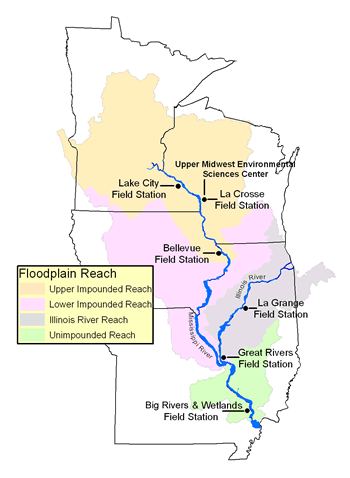 |
Upper Mississippi River Restoration ProgramLong Term Resource Monitoring |
|
 |
||
Big Rivers and Wetlands Field Station |
The Big Rivers and Wetlands Field Station (BRWFS) was established on January 2, 1991, the last field station added to the Long Term Resource Monitoring Program (LTRM). It is the only field station located on the unimpounded (open) reach of the Upper Mississippi River. Today there are six personnel that conduct research on fish, wildlife, vegetation, and water quality. Current staff includes the Field Station Supervisor, David Herzog who began his career in 1991 as the field station’s LTRM Fisheries Component specialist. He then became LTRM Fisheries component leader and later Large River Ecologist. Mr. Herzog has a Master’s of Natural Science degree from Southeast Missouri State University and a Bachelor’s degree in Fisheries and Wildlife Management from the University of Missouri-Columbia. Molly Sobotka joined the Missouri Department of Conservation as Water Quality staff scientist in 2012. She was promoted to Systems Ecologist in 2017. Molly has diverse and extensive experience in aquatic ecosystems, floodplain lake ecology, fish habitat association, and ecosystem metabolism. Molly completed her Bachelor of Arts in Biology from Washington University in 2007 and her Masters of Science in Biology from Virginia Commonwealth University in 2011. Molly’s research emphasis includes long-term water quality monitoring, river metabolism, (primary productivity and community respiration), and abiotic and biotic interactions. Frank Nelson is a Wetland Ecologist and has a Masters of Fish and Wildlife Sciences degree from University of Missouri-Columbia and a Bachelor’s degree from William Jewell College. Frank works closely with wetland and waterfowl biologists across the state. His focus is utilizing research and technology to enhance wetland management and wetland restoration. Sara Tripp, Large River Ecologist, has a Masters of Zoology/Fisheries Ecology and Management; a B.S. from Southern Illinois University–Carbondale, and an Associate degree from Shawnee Community College. Sara develops research on large river fish population demographic data (i.e. age, growth, mortality, home range) to assist river managers in making policy decisions. Her responsibility includes examining recreational and commercial fisheries of Missouri’s large rivers for management and sustainability. Dave Ostendorf, Environmental Resource Scientist, has worked in various capacities for the LTRM at the field station and now works statewide on many large river issues. Mr. Ostendorf curates a large image collection for the BRWFS (especially Missouri fishes), and has a Bachelor’s degree from Southeast Missouri State University. The LTRM Fisheries component specialist (Environmental Resource Scientist) is Mr. John West. John has a Master’s degree from Eastern Illinois University and a Bachelor’s degree from Southern Illinois University-Carbondale. John The LTRM Water Quality component (Environmental Resource Scientist) is Ms. Jessica Fulgoni. Jessica is completing her PhD in Zoology from Southern Illinois University–Carbondale where her research focused on restoration and ecosystem functions in midwestern streams. Jessica completed her Masters of Science in Environmental Science from Indiana University’s School of Public and Environmental Affairs in 2012. Her master’s research investigated the water quality in agricultural streams as part of the Mississippi River Basin Healthy Watershed Initiative in southern Indiana. She received her Bachelor of Science in Biology and Environmental Science from Central Michigan University in 2009. Jessica’s research interests include water quality, ecosystem functions, and macroinvertebrates. BRWFS staff is supervised by a Field Station Unit Chief from the Resource Science Division in Jefferson City. BRWFS staff is involved in a variety of activities encompassing research, management, planning, and education programs. The primary responsibility of BRWFS staff is to carry out the conservation mission of the Missouri Department of Conservation relative to the state’s large rivers, including the contractual obligation with the LTRM. Field station LTRM staff collects fish, wildlife, vegetation, and water quality data along a 50-mile stretch of the Middle Mississippi River, approximately 25 miles north and south of Cape Girardeau. Since 2003, the responsibilities of the BRWFS have become statewide, thus field station staff conduct monitoring and research projects on all of Missouri’s big rivers and wetlands in all regions of the state. The location of the BRWFS at the lower end of the Upper Mississippi River and the upper end of the Lower Mississippi River is important because data collected and information provided by BRWFS staff are used by both upper and lower river biologists. As a result of this, the BRWFS continues to garner strong support by Upper Mississippi River, Lower Mississippi River, Missouri River, universities, US Fish and Wildlife, USGS, Corps of Engineers, and non- governmental agency personnel spanning multiple disciplines. David Herzog, Field Station Team Leader Missouri Department of Conservation Field Station Directory – Big Rivers and Wetlands Field Station |
|
|
|
Page Last Modified: June 21, 2018



